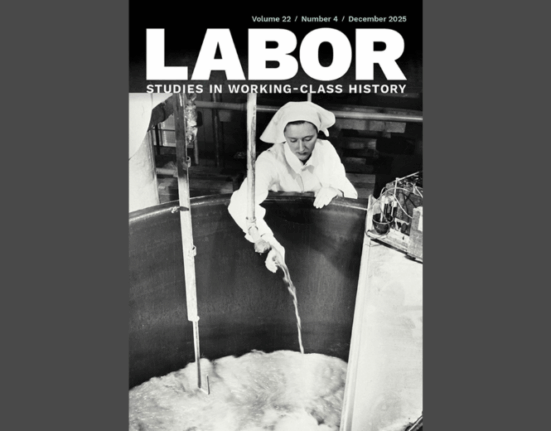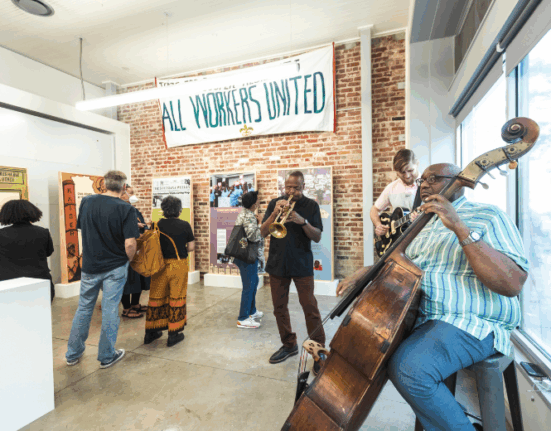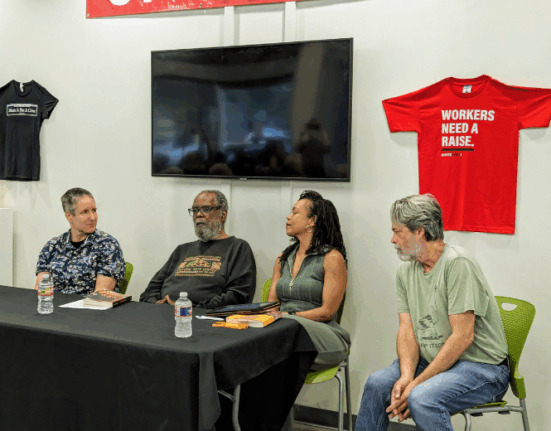Readers of this blog are probably aware of what has been going on in the state of Wisconsin over the past couple of months. To recap: back in early February, Governor Scott Walker proposed a massive cut to the state education system of about $300 million, with the promise of reducing the state’s system of higher education to a “public authority.” Then, in February, the Republican-dominated legislature held an “extraordinary” session to turn Wisconsin into the nation’s 25th right-to-work state. Walker, who initially opposed the effort , signed the bill into law in early March, outlawing union security clauses in the private sector (Act 10, of course, had already stripped agency shop provisions from the state’s public sector workers).
It is evident that Walker’s agenda is based on an aggressive attempt to attract wealthy right-wing donors in advance of the Republican primaries in early 2016, so he is trying to garner as much attention as possible by taking on both the education sector and unions—the two institutions seemingly loathed the most by right wing ideologues like the Koch Brothers who bankroll Republican candidates. Though Walker would later cite as a “drafting error” the budget’s attempt to scrap the very mission of the university system—among other things, writing out the “search for truth” as a goal of the public university system and replacing it with the lofty aspiration of meeting the “state’s workforce needs”—it is clear that he sees the expansion of business interests at the expense of the public as the difference maker in attracting the avalanche of money necessary to win a Presidential election in the US. Because of Walker’s aggression, you might say Wisconsin is ground zero for neoliberalism these days.
The university proposal has clearly gone too far, however, even for a lot of Republicans in the state. Many of them realize that Walker will be out of Wisconsin politics one way or another in a few years, and the state will be left with a clearly diminished university system. If the cuts are passed in their current iteration, there is simply no way they will be anything other than catastrophic. There is still a lot of discussion about how the cuts will be doled out among the UW System’s 13 4-year campuses, but they are largely proportional to campus size. In its proposed iteration, my campus (UW-Green Bay) will be looking at about $4.5 million per year in the next biennium. This amounts to over 13% of our yearly discretionary budget, which is from where virtually all of the salaries for faculty and staff derive. The UW campuses have been cut to the bone already—Wisconsin is one of just a handful of states in which funding, even before this current budget proposal, has continued to decline even as the economy improves—and tuition has been frozen now for two years and will continue to be frozen until 2017 at least.

We don’t yet know what will happen to Walker’s budget proposal when the legislature’s Joint Finance Committee is finished with it, but most sources of information on the subject—including university system President Ray Cross—think the cut will be reduced significantly (the most optimistic rumors are by half) but will still be substantial. Even in the best case scenario, the cut will still seriously diminish the public university system; the worst-case scenario is very difficult to fathom. Programs will certainly be cut on some campuses, adjuncts—already facing precarious working conditions—will be let go, student services and employment opportunities will be diminished, and tenure-line faculty will almost certainly see larger class sizes and fewer course reassignments for administrative tasks. Four campuses—including mine—have begun offering extensive early retirement incentives to faculty and staff, which, though they will probably save some deeper cuts elsewhere also have the ancillary effect of diminishing the tenured, senior faculty who can serve as the vital counterweight to the growing power of some high-level administrators who hope to see universities function more like corporations. There simply is no way that those who remain employed in the system will not be asked to do much more while the quality of education is reduced substantially.
One of the reasons Gov. Walker proposed the public authority—which would strip a good deal of state oversight—is because President Cross and the campus chancellors supported it. They touted the “flexibility” as a cost-saving measure, but there has been no evidence that it will save either the system or individual campuses money. On the contrary, much of the support for the proposal among university administrators clearly stems from the fact that, starting in 2017, the proposed UW System Authority (exactly what that might be is still unclear), governed by the university regents, could institute a more “rational” tuition policy. Presumably, this means that the system would dramatically raise tuition—putting even more of the already high cost of higher education onto the backs of our state’s working- and middle-class students.
Ironically, it is this concern, in addition to the fact that President Cross has publicly pledged to uphold our state university system’s apparatus for tenure and shared governance, that has led legislators to push back against the Public Authority. Wisconsin appears to be the only state in the nation in which tenure rights and shared governance (including rights for faculty, staff, and students) are inscribed in state law; because Walker’s proposed budget removed this provision (called Chapter 36) as part of the public authority proposal, it is necessary—because of how the budget process works in Wisconsin—that the legislature re-insert it (something about which several Republican legislators are not enthused) when the budget is passed. Thus it is quite possible that the end result of this fight will be that a grave cut will be combined with a more-or-less permanent tuition freeze AND the loss of statutory rights to tenure and shared governance.

With all of this going on (and Walker’s budget riled up a host of other constituencies, too, as it, among other things, cut funding—though not as deeply—for K-12 education, proposed to augment funds for our state’s voucher system, and called for drug testing welfare recipients), it presented the golden opportunity for the legislature to push for right-to-work. Activists on campus and off were just beginning to mobilize against the cuts to the university system when Republicans dropped that bombshell. For those on the right, the timing couldn’t have been better, as it divided everyone’s attention. Our faculty and staff union here at UWGB—an AFT local—had begun coordinating an effort to ask constituents to contact their legislators in the districts of the representatives on the Joint Finance Committee; suddenly, however, AFT-Wisconsin (rightly) had to temporarily drop everything, including their support for this project, in order to focus on trying to forestall right-to-work. I think it is pretty clear that the much more muted response to the right-to-work fight here in Wisconsin (compared to the response following Act 10), stemmed from the fact that many of those who would have been sympathetic—particularly on the campus—had their attention pulled elsewhere. A conspiracy theorist might see the timing of these two events as the residue of design.
All of this in tandem has prompted Wisconsinites to view with growing legitimacy the idea that the state is morphing from its progressive past into something called “Wississippi.” In the state that once brought Fightin’ Bob Lafollette and Victor Berger to national prominence, featured socialist mayors in Milwaukee for much of the twentieth century, served as a bulwark for organized labor, and amply supported a university system that represented the model for similar systems across the nation, we now dramatically limit educational opportunity and make it as difficult to unionize as it is in Mississippi. We might also add that Wisconsin has the dubious distinction of incarcerating the highest percentage—even higher than in Mississippi—of black men in the country. I grew up in Mississippi, and I’m proud to have a lot of fantastic friends and family there, but if recent American history has taught us anything, it is that Mississippi is not where we should be looking for lessons in political economy.
This is only my second year as a professor in the Wisconsin system. In spite of Act 10, I was excited to get a job at UW-Green Bay, and I really appreciate my students. Most of them come from working-class backgrounds, and they work hard: I can’t count the number who work full-time jobs while taking a full course load. The perspectives that they bring to the broad, interdisciplinary education they get here at UWGB (we have a unique system in which academic units are organized around intellectual “problems”—my unit is Democracy and Justice Studies) is anything but the job-obsessed utilitarianism that those who want to re-make our public education system believe students should have. For most of our students, their class background gives them an already critical perspective, and many of them really come alive intellectually in our program. It is a shame that the end result of this budget will be a system that makes it more difficult for them to grow as thoughtful individuals and will almost certainly in the long-term leave them with more debt when they are finished than the already unconscionable amount most students leave school with now.
But, as the old adage goes, from crisis comes opportunity. The students, staff, and faculty here at UWGB are organizing, and just as importantly, putting serious thought into how a university (and a society) should function. The students on our campus have already organized a demonstration here at UWGB, and this week convened students from across the university system in a demonstration in Madison. During the meetings of our faculty and staff union, we’ve had conversations about the importance of things like tenure and shared governance that we’ve previously taken for granted.
We’ve also organized around even bigger issues: on National Adjunct Walkout Day we held a teach-in, and it ended up as an event that, in the larger context of the budget crisis, brought tenured and adjunct faculty together in a vital discussion of how academic labor is organized on campus. Our union has also shared the camaraderie that comes from contacting our legislators and phone-banking.
In addition, AFT-Wisconsin’s Higher Education Council—because of the very dramatic way that this new budget combined with right-to-work threatens our way of life here—has brought together activists from across the state to coordinate responses both on our campuses and across the system.
Finally, it is hard to imagine that the Wisconsin Labor History Society’s annual conference in Madison on April 11—featuring Joseph McCartin as our keynote speaker—could be any more important than right now. That day promises to initiate a stimulating discussion of how we can help re-shape the trajectory for working people in this state and beyond.
Certainly nobody hoped any of this would happen when Gov. Walker was re-elected last fall, but clearly the radical nature of these changes has brought people in Wisconsin together in ways they weren’t before. We must work hard to sustain these kinds of connections, but we have a real framework to do so.
It is possible that all of this represents a false start that does not go very far. As a labor historian, I’ve studied a lot of social movements, but I’ve lived through fewer. If nothing else, however, the situation in Wisconsin has shown me and a lot of other people here that the only way we can have real democracy is to work together against the forces that would deny us. What we choose to do with that realization is up to us.








2 Comments
Comments are closed.